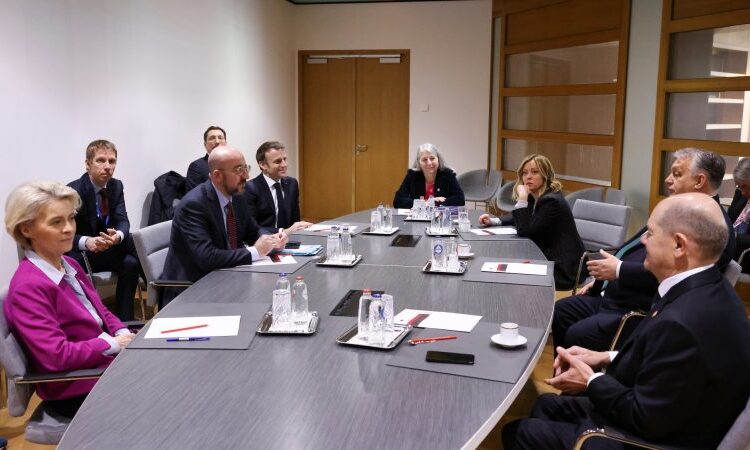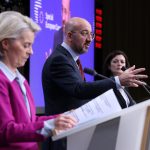
On Thursday (1 February), EU leaders unanimously agreed on the bloc’s financial aid to Ukraine and overcome another Hungarian veto threat. Here’s what that deal means going forward.
When they arrived in Brussels, EU leaders had feared the worst: A veto on the part of Hungary’s Prime Minister Viktor Orbán at a time when US funding for Ukraine remains uncertain, and Kyiv is running out of everything it needs to fight off Russia’s invasion.
Against all expectations, Orbán gave in to a compromise and unblocked the €50 billion package after having vetoed it in December.
Speculation was rife about whether the Hungarian leader had capitulated in the face of pressure from his 26 counterparts and the potentially serious political consequences a veto would have had on his country’s position inside the bloc.
Or did he obtain concessions?
What the deal means for Hungary…
At this stage, the deal looks like a defeat for Hungary, as he sees none of his key demands met.
According to the agreement, Hungary will not get any annual vetoes over the Ukraine package for the disbursements until 2027. The EU money will start going to Ukraine in March.
However, two paragraphs in the summit conclusions were crucial to securing the achieved unanimity.
Much of the wording came from last-ditch shuttle diplomacy the night before and on the morning of the summit.
With one paragraph, Budapest got a minor concession of annual reports and debates on implementing the money, which unlocked the deal.
“If needed, in two years, the European Council will invite the commission to propose review in the context of the new MFF (multi-financial framework — the long-term EU budget),” the text read.
However, a review can only be triggered by unanimity of all EU27, which theoretically means one of the bloc’s staunch Ukraine supporters could prevent it.
At Orbán’s request, the second paragraph refers to a 2020 deal in which the bloc said a conditionality mechanism would treat all member states equally when determining whether to withhold EU funds.
Some read this as a hint from EU member states to the European Commission to unfreeze some of the €10 billion held back from Hungary over rule-of-law concerns, or at least be more lenient with the strict milestones Budapest has to fulfil.
To Orbán’s ears, this could be translated as a call for the EU’s executive to be more tolerant of Hungary.
But EU officials say unlikely Orbán will see any money meant for Budapest very soon.
However, a turning point in the EU funds saga could come the closer we get to the European Parliament elections, with the institution traditionally tough on Orbán, turning its attention to the campaign.
While this might not seem much concerning concessions to Budapest, it was seen as enough for Orbán to claim victory back home. EU officials privately admitted that he, again, got what he had been seeing all along – attention.
After the talks, he declared that “Hungary’s funds will not end up in Ukraine, and we have a control mechanism at the end of the first and second year” – something which was not even an option in the first place.
… and the EU
Confirmation of the swift agreement came after a small group of EU leaders – in different constellations – before the formal summit drafted the acceptable text and persuaded Orbán to drop his veto over the funding package.
A trio of leaders that Orbán has steadily interacted with over the past week – Italy’s Prime Minister Giorgia Meloni, France’s President Emmanuel Macron, and European Council President Charles Michel – were fundamental for sealing the deal, according to people familiar with the talks.
EU officials also point to the fact that member states had an uncompromising and united stance in lead-up talks with Orbán, which helped persuade the Hungarian prime minister to agree.
Walking into the summit on Thursday morning, EU leaders stressed that while a deal without Hungary was possible, it would signal a lack of European unity, not only towards Russia. This also comes against the backdrop of European allies having long complained that Orbán’s defiance plays into the hands of Vladimir Putin.
EU diplomats and officials were also adamant that Orbán simply had to give in to avoid a major political crisis.
However, the happy ending does not mean Hungary’s veto threat won’t loom over future EU decisions, whether on Ukraine or other matters.
Despite dropping his veto, EU officials point to the fact that Orbán remains set on one thing: a fundamentally different understanding of the Ukraine war than the other EU26, something he reiterated in the talks itself.
For European Council Charles Michel, the swift deal was also a personal victory, after he came under fire for the handling of his job.
And through Ukraine’s lens?
For Kyiv, Thursday’s financial aid deal is the second EU victory out of three after the political decision in December to open accession talks.
Ukraine was expected to run out of cash to run normal government functions in March, this can now be averted with €33 billion in loans and €17 billion in grants out of the EU budget.
Ukraine’s President Volodymyr Zelenskyy praised the decision in his address to EU leaders as “a clear signal” that “its word matters and its promises work for the interests of entire Europe”.
But money won’t be enough for Kyiv.
There is the sense that Ukraine’s accession process could be further slowed down to appease Budapest, but member states also remain wary of too speedy EU enlargement.
The European Commission already had a late start of the EU’s accession screening process for Ukraine, with member states wondering why the process had not started in December, as expected.
Meanwhile, Ukraine’s desired third victory is unlikely before the EU’s March summit.
Zelenskyy struck a more sombre tone, recalling to EU leaders that the EU is expected to fall short of its self-set one million ammunition target for Ukraine, which was meant to be achieved by March, and still has not found agreement on a reform of its weapons fund to supply Kyiv with more weapons.
With the situation on the battlefield grinding into a stalemate along the frontline, Ukraine will desperately need more Western military aid if it wants to hold or push back Russian troops.
A signal to Biden
The step is also a significant signal to Washington, as the US Congress has so far disagreed on more of its own Ukraine funding as it is considering a request from President Joe Biden to approve an additional $61 billion.
The request from October last year, which also includes an allocation for Israel, has been stalled by US Republicans’ insistence that it be tied to an unrelated shift in immigration policy.
Von der Leyen told reporters she hoped the EU’s move would inspire the US to follow suit.
“It will be an encouragement to the United States to do their fair share,” she said after the decision.
Just after the decision was made in Brussels, US President Joe Biden, in a phone call with Von der Leyen, hailed the bloc’s approval of €50 billion in aid for Ukraine, the White House said.
Biden welcomed the “significant financial aid package”, which will “go a long way to helping Ukraine as they continue to battle back against Russia’s aggression,” National Security Council spokesman John Kirby told reporters.
US Democrats also announced the US Senate would vote next week on a border security package that would unlock vital aid for Ukraine.
US Senate majority leader Chuck Schumer had earlier said that lawmakers would release within days the text of the legislation concerning US security assistance and changes to immigration policy.
The bill is expected to pass the Senate, where Biden’s Democrats have a slim majority, but its prospects in the Republican-controlled House of Representatives are much less specific.
[Edited by Alice Taylor]







